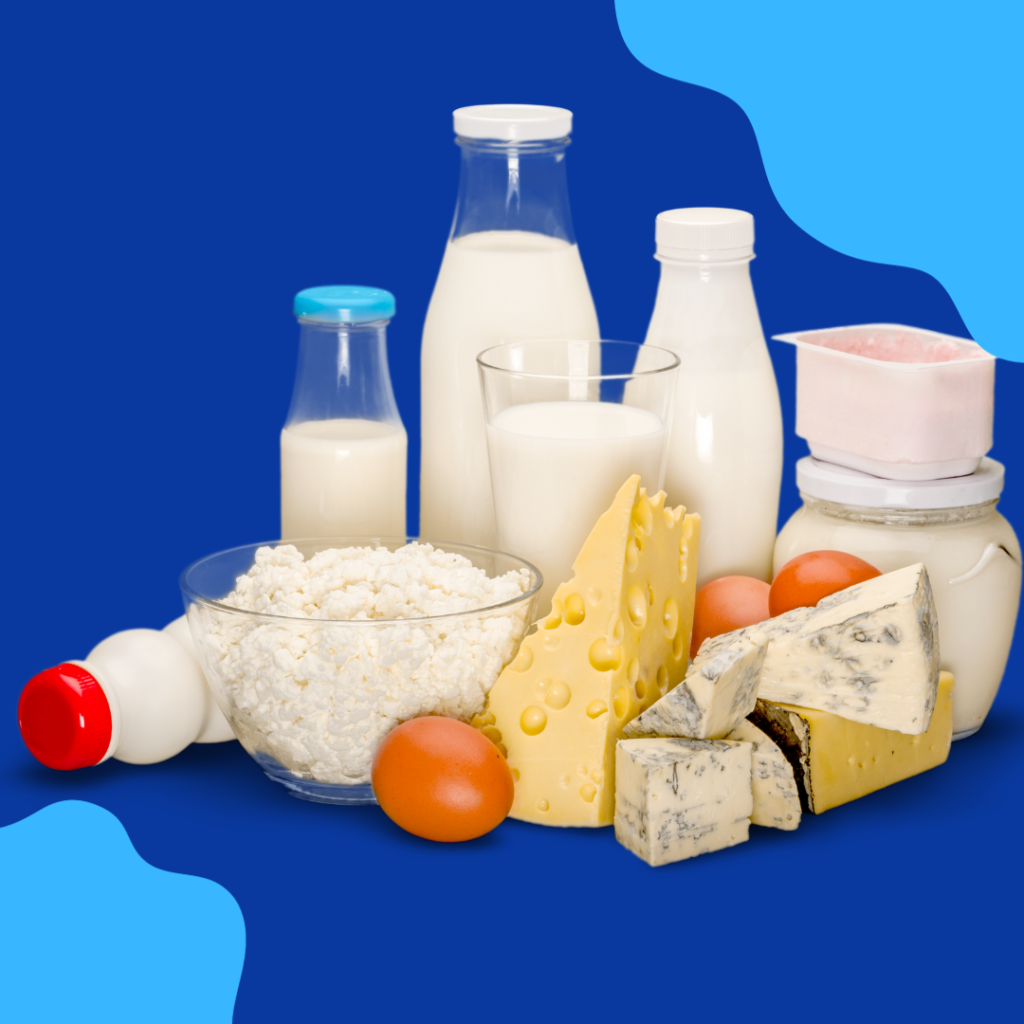The Ultimate Guide to Dairy and Keto: Best Substitutes, Benefits, and Tips
The ketogenic diet, or Keto diet, has gained popularity in recent years for its potential health benefits and weight loss effects. However, one of the challenges of following a Keto diet is navigating the restrictions on certain foods, including high-carb items like bananas and sweet potatoes. But what about dairy? Can you still enjoy dairy products while on Keto? In this ultimate guide, we will explore the world of dairy and Keto, including low carb options, substitutes, the benefits of dairy, and tips for a dairy-free Keto diet.
Understanding Dairy on Keto
Before we dive into the specifics of dairy on Keto, let’s clarify what we mean by “dairy.” Dairy refers to any food produced from or containing the milk of mammals, such as cows, goats, sheep, and even camels. This includes milk, yogurt, cheese, butter, ghee, cream, custard, kefir, casein, whey, ice cream, and frozen yogurt. However, not all dairy products are created equal when it comes to their compatibility with the Keto diet.
The Carb Criterion
When assessing whether a food is Keto friendly, the primary consideration is its carbohydrate content. To enter ketosis, the fat-burning state that characterizes the Keto diet, you generally need to limit your daily carb intake to under 10% of your total calorie consumption (for some individuals, this may be closer to 5%). This translates to restricting net carbs (total carbs minus fiber and sugar alcohols) to between 20 and 50 grams per day.
Low-Carb Dairy and Dairy to Avoid
Unfortunately, most commercially available dairy products are not Keto friendly due to their high sugar and carb content. Items like fruity yogurts and flavoured ice creams are often saturated with added sugars like sucrose, high-fructose corn syrup, and “natural” sweeteners like honey. Even plain milk, including whole milk and evaporated milk, contains around 10 grams of lactose (a naturally occurring milk sugar) per serving, making it unsuitable for a Keto diet.
However, there are low carb dairy options that can be enjoyed on Keto. These include:
- Butter
- Ghee
- Heavy cream or heavy whipping cream
- Sour cream
- Most cheeses like mozzarella, gouda, brie, muenster, Monterey jack, mascarpone, provolone, cheddar, cream cheese, cottage cheese, parmesan, and blue cheese
- Unsweetened kefir
- Unsweetened Greek yogurt
These dairy products are low in both added sugar and lactose, making them suitable for a Keto lifestyle. Incorporating them into your diet can provide essential macronutrients and beneficial micronutrients.
Low carb dairy products are rich in macronutrients, primarily fat and protein. The fat in these dairy products is predominantly saturated fat, which, contrary to popular belief, does not necessarily lead to heart disease. Numerous studies have found no significant link between dietary saturated fat and heart disease risk. In fact, saturated fats like those found in butter and ghee are healthy fats that can withstand high temperatures without oxidizing, unlike vegetable oils.
Dairy products also contain two types of protein: casein and whey. These proteins are highly digestible, efficient in stimulating growth, and have high biological value, meaning they are well incorporated into bodily tissues. For those who tolerate it, casein or whey protein powder can be a valuable addition to a Keto smoothie or other recipes.
In addition to macronutrients, dairy provides several beneficial micronutrients, vitamins, minerals, and other compounds. Here are some examples:
- Conjugated linoleic acid (CLA): May aid in fat loss and reduce the risk of heart disease.
- Calcium: Essential for supporting bone health.
- Vitamin A: Boosts the immune system.
- Lactoferrin: Aids in bone regeneration and immune function.
- Alpha-lactalbumin and beta-lactoglobulin: Used for allergies and immune support.
- Immunoglobulins (IGG, IGA): Boost immunity against infections.
- Lysozyme: Helps fight against infections.
These nutrients, along with the satisfying flavour and texture of dairy products, make them a valuable addition to a Keto diet.
Dairy Allergy and Intolerance
While dairy can be beneficial for many, it’s important to note that some individuals may have allergies or intolerances to dairy products. A dairy allergy can be severe and even life threatening, with even trace amounts of milk triggering anaphylaxis. The most common allergens in dairy are casein, alpha-lactalbumin, and beta-lactoglobulin.
Dairy intolerance, on the other hand, is more common. Approximately 65% of people are lactose intolerant, and many individuals may also have sensitivities to whey or casein. If you cannot tolerate dairy, it is essential to listen to your body and find alternative sources of fat, protein, and nutrients. Meat, fish, olive oil, coconut oil, avocados, nuts, seeds, eggs, sardines, spinach, and turnip greens are excellent options to consider.
Remember, the Keto diet can still be successful and enjoyable without dairy. Your comfort and overall well-being should always be a priority.
Keto-Friendly Dairy Substitutes
If you choose to limit or eliminate dairy from your Keto diet, there are numerous dairy substitutes available that can still provide the desired taste and texture without compromising your nutritional goals. Here are some of the best dairy substitutes for a Keto lifestyle:
Dairy-Based Keto Substitutes
- Heavy cream or heavy whipping cream: With its high fat content, heavy cream is an excellent substitute for milk in recipes. It can be used in sauces, soups, coffee, or tea.
- Half & half: A mixture of milk and cream, half & half can be a suitable alternative to whole milk, although it has a slightly lower fat content.
- Non-Dairy Keto Substitutes
- Unsweetened coconut milk: Pure coconut milk, with just coconut and water as ingredients, is a high fat vegan friendly substitute for milk. Look for unsweetened options like Native Forest Organic Coconut Milk or Aroy-D Coconut Milk.
- Unsweetened nut milk: Made from almonds, cashews, walnuts, macadamias, or hazelnuts, unsweetened nut milk is widely available. Ensure the product has a short ingredient list and contains less than 2 grams of net carbs per cup. Examples include Elmhurst unsweetened nut milk and So Delicious unsweetened nut milk.
- Unsweetened seed milk: Flax milk and hemp milk are suitable alternatives for those with nut and dairy allergies. Check the ingredients for other carb rich additives and aim for less than 2 grams of net carbs per cup. Pacific Foods Unsweetened Hemp Milk and Good Karma Unsweetened Flaxmilk are notable options.
- Unsweetened soy milk: While most soy milk products are high in carbs, there are keto friendly unsweetened organic soy milk options available. Look for products with no more than 2 grams of net carbs per cup, such as Silk Organic Unsweetened Soy Milk.
- Unsweetened pea protein milk: Made from pea protein, products like Ripple Unsweetened Original Plant-based Milk are dairy free, nut-free, vegan friendly, and high in protein. Ensure you read the label, as not all pea milk products are keto friendly.
When substituting dairy, aim for unsweetened, higher fat varieties while avoiding high sugar products. Remember to check the net carbs, ingredients, and serving size to ensure the product aligns with your Keto goals.

If you’re having trouble finding a suitable Keto milk substitute, you can easily make your own at home. This allows you to control the ingredients and customize the flavor to your liking. Here’s how to make homemade nut milk or seed milk:
Homemade Keto Nut Milk
- Soak 1 cup of raw nuts (such as almonds) overnight.
- Rinse the soaked nuts and add them to a blender with 4 cups of filtered water.
- Blend until smooth.
- Strain the mixture through a muslin cloth or nut bag to separate the milk from the pulp.
- Squeeze out the milk from the pulp, discarding the remaining solids.
- Enjoy the homemade nut milk immediately or store it in an airtight container for 3-5 days.
Homemade Keto Seed Milk
- Add 1/2 cup of seeds (such as flax or hemp) and 4 cups of water to a blender.
- Blend until smooth.
- Strain the mixture through a muslin cloth or nut bag to remove any solids.
- Discard the pulp or repurpose it as a substitute for flaxseed meal in vegan keto recipes.
- Serve the seed milk immediately or store it in a sealed container in the fridge for up to a week.
To add flavor to your homemade nut or seed milk, consider incorporating sugar-free vanilla extract, keto-friendly sweeteners, pure cocoa powder for a chocolate milk substitute, or spices like cinnamon and ginger. A pinch of salt can also enhance the taste.
Replacing Milk in Recipes
When using a Keto milk substitute in recipes, it’s essential to maintain the intended flavour and consistency. Here are some tips for successful substitutions:
- Use a 1:1 substitution ratio: Replace milk with your preferred alternative in equal amounts. If a recipe calls for two tablespoons of milk, use two tablespoons of your chosen substitute.
- Consider the fat content and flavour: Higher-fat substitutes like heavy cream or coconut milk can add richness to dishes, while lower-fat options may dilute flavours. Match the fat content of the substitute to the original recipe for the best results.
- Track macronutrient differences: Dairy substitutes can have varying protein, fat, and carb content compared to milk. Take this into account when tracking your nutritional intake to ensure you stay within your desired keto range.
Remember that experimentation is key when substituting milk in recipes. Adjustments may be necessary to achieve the desired taste and texture.
Milk Substitutes to Avoid on Keto
While there are numerous keto friendly milk alternatives, some products should be avoided due to their high carb content or non keto ingredients. Here are a few milk substitutes to steer clear of on Keto:
- Grain based milk: Varieties like oat milk and rice milk often have more net carbs than regular milk, even in their purest form.
- Lactose free milk: Lactose free milk still contains carbs, but the lactose has been converted into easier-to-digest sugars.
- Sweetened products: Avoid milk substitutes with added sugars like cane sugar, cane syrup, dried cane syrup, evaporated cane juice, or brown rice syrup.
- Flavoured milk products: Flavoured options usually come with added sweeteners, so opt for unsweetened varieties instead.
- Products with chemical additives: Some milk substitutes contain thickeners, stabilizers, and artificial preservatives. It’s best to choose products with minimal ingredients or make your own.
By avoiding these milk substitutes and opting for low carb, unsweetened alternatives, you can maintain a keto friendly diet while still enjoying a wide range of flavours and textures.
Evaporated milk and sweetened condensed milk are concentrated sources of sugar and carbs, making them unsuitable for a Keto diet. However, there are keto friendly substitutes available for these products, allowing you to enjoy recipes that call for evaporated or sweetened condensed milk without derailing your nutritional goals.
Evaporated Milk Substitutes
To replace evaporated milk in recipes, consider these options:
- Full-fat coconut milk: This vegan friendly substitute adds a subtle coconut flavour and works well in various dishes, including desserts and curries.
- Heavy cream: A versatile substitute that can be used in sauces, soups, pie fillings, baking, custards, and frozen desserts.
- Half & half: Similar to evaporated milk, half & half is a mixture of milk and cream. It can be used as a substitute for whole milk in recipes.
These substitutes can be used in a 1:1 ratio, but remember to consider the flavor and fat content of each substitute to achieve the desired taste and consistency.
Sweetened Condensed Milk Substitute
Making your own keto friendly sweetened condensed milk substitute is a great way to enjoy the flavour without the added sugar. Here’s a simple recipe to try:
Ingredients:
- 1 cup of heavy whipping cream
- 4 tablespoons of unsalted butter
- 1/2 cup of allulose (a sugar substitute)
- 1/4 cup of granulated erythritol (another sugar substitute)
Instructions:
- In a saucepan, combine the heavy whipping cream and butter over low heat.
- Stir until the butter has melted and the mixture is well combined.
- Add the allulose and granulated erythritol, stirring continuously until dissolved.
- Increase the heat to medium-low and simmer for about 25-30 minutes, stirring occasionally, until the mixture thickens and reduces to the consistency of sweetened condensed milk.
- Remove from heat and let it cool before using in your desired recipes.
This homemade sweetened condensed milk substitute can be stored in the refrigerator for up to two weeks. Enjoy the rich flavour without the guilt of added sugars.
Conclusion
Navigating the world of dairy on a Keto diet can seem challenging at first, but with the right knowledge and substitutes, you can still enjoy a wide variety of flavours and textures while maintaining your nutritional goals. Whether you choose to include low carb dairy options or opt for dairy free alternatives, there are plenty of delicious options available.
Remember to prioritize your body’s needs and listen to any allergies or intolerances you may have. The Keto diet can be successfully followed with or without dairy, so find what works best for you and embrace the journey towards a healthier lifestyle.
Note: Always consult with a healthcare professional or registered dietitian before making any significant changes to your diet, especially if you have specific health conditions or concerns.
Additional Information
- Consider experimenting with different dairy substitutes to find your favourite flavours and textures.
- Incorporate dairy-free Keto recipes into your meal plans to maintain variety and enjoyment.
- Explore the wealth of resources available for Keto beginners, dairy free Keto, and vegan Keto diets to enhance your understanding and success on your journey.








